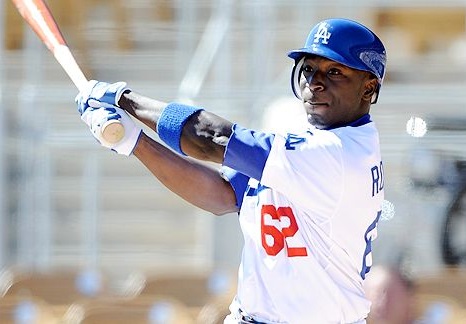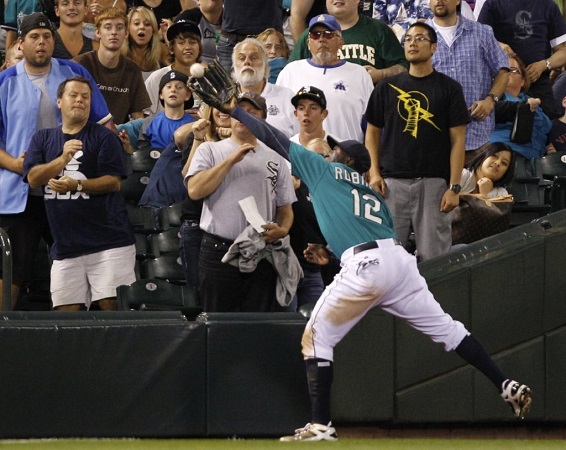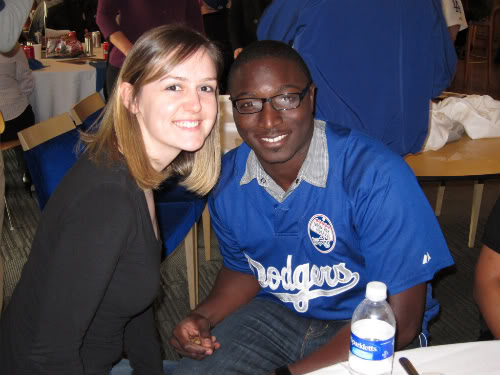Trayvon Robinson has returned to Dodger Blue. Well, perhaps not to Dodger Blue exactly, but at least to the Dodgers fold with a minor league contract and an invitation to big league camp. Unless he chooses, as former Dodger prospect Josh Bell did, Robinson should once again patrol the outfield with the Albuquerque Isotopes in 2014. Bell, after signing a minor league contract with the Dodgers, decided to play with the LG Twins of Korea Professional Baseball – a Pacific League starting its thirty-third season in 2014.
The ranks of the 2013 Albuquerque outfield have been decimated through minor league free agency – Matt Angle has signed a minor league contract with the Miami Marlins, Tony Gwynn Jr. has signed with the Philadelphia Phillies and it as though the Dodgers will not be re-signing free agent Jeremy Moore. Speculation is that Scott Van Slyke will make it as a bench player with the Dodgers in 2014. With Nick Buss returning to Albuquerque and Joc Pederson most likely being promoted from the AA Chattanooga Lookouts, the 26-year-old Robinson and his MLB experience will most likely have a role to play with the Isotopes. That is, as a starting outfielder and outfield depth for the Dodgers.

Robinson has always been extremely popular and well respected by his teammates.
(Photo credit – Harry How)
The switch-hitting Robinson was born and raised in South Central Los Angeles where he attended Crenshaw High School, the same high school from which Daryl Strawberry graduated. Needless to say, once he started playing baseball in the ninth grade his goal was to follow in Strawberry’s footsteps and play major league baseball. His skills did not go unnoticed as Robinson was drafted by the Dodgers in the tenth round of the 2005 First Year Player Draft.
Trayvon Robinson’s initial progress was slow and no doubt a bit agonizing for him, an aggressive, extremely hard working player. After two very ordinary seasons with the Gulf Coast League Dodger he began the 2007 season with the Great Lakes Loons of the Midwest Class A League. As a nineteen-year-old he hit only .253 with two home runs, 31 RBI and he struck out 119 times. The following season he was promoted to Inland Empire of the high A California League where he spent two seasons with the 66ers. In 2009 Robinson responded with a .306 BA, showed good power with 15 homers, drove in 54 runs and stole 43 bases, one behind league leader Tyson Gillies of the High Desert Mavericks.
The 2009 season marked a turning point for Robinson. He was selected as a starting outfielder in the California League All-Star Game and was added to the Dodgers 40-man roster. In 2010 he advanced to the Chattanooga Lookouts of the AA Southern league where his upward progression continued. He hit an even .300, with 9 home runs, 57 driven in and had an OBP of .404.
The 2011 season marked another turning point for Trayvon Robinson. He had his best minor league season with the Albuquerque Isotopes where he hit .293 with 26 home runs and 75 runs batted in. He was ranked among the Dodgers top ten minor league prospects by Baseball America (10) and others including FanGraphs (3), SB Nation (3) and Baseball Prospectus (4). Many Dodger fans were waiting in anticipation of a September call up for Robinson.
And then the unthinkable happened.
On July 31 Trayvon Robinson was traded by the Dodgers to the Seattle Mariners as part of a three-team trade that brought Boston minor leaguers Tim Federowicz, Juan Rodriguez and Stephen Fife to the Dodgers with left-hander Érik Bédard, considered the prize of the deal, going from the Mariners to the Red Sox. Although accepting of the trade, especially when he learned he would be going to Seattle instead of Boston, Robinson indicated he was hurt by the trade.
“Everything they told me to do, I did it,” Robinson said. “I didn’t disrespect the uniform. I always tried to wear the Dodger jersey the way Jackie Robinson did, with a lot of pride and courage.”

Robinson is an excellent defender with good speed but he has had difficulty hitting major league pitching. (AP photo)
Robinson spent two partial seasons with the Mariners. In 288 AB’s he hit only .215 with five home runs, 26 RBI and seven stolen bases. On November 20, 2012 he was traded again, this time by the Seattle Mariners to the Baltimore Orioles for infielder Robert Andino. On February 8, 2013 Robinson was designated for assignment by Baltimore but was not claimed off waivers and remained in the Orioles minor league system, where he spent the entire 2013 season. Robinson became a free agent on November 5, 2013.
Baseball is a strange game – so easy to love – but it breaks hearts so easily. I’m guessing Trayvon Robinson’s heart has been broken more than once but the character and courage of this young man will soon cause it to heal and 2014 brings with it a new adventure for the L.A. native. His life experiences as a youth helps demonstrate some of his greatest qualities – those not found on the end of a baseball bat.

Robinson has always been very active in the community and is a huge fan favorite.
(Photo credit – Ron Cervenka)
He was fortunate to have a strong mother, a strong will to succeed and others around him to help him avoid the dangers of life that seemed to surround him growing up in South Central Los Angeles. Andre Green, the assistant baseball coach at Crenshaw High School, made countless trips to and from the school assuring Robinson got to class and home from practice safely. That began after a drive-by shooter opened fire on one of Robinson’s friends near this same curb, spraying the family apartment with bullets as the wounded victim escaped into a neighboring unit. “Trayvon and his brothers were inside and they hit the floor,” said Green, “They were lucky because they were in the back.”
Andre Green, now an assistant church pastor, had himself been a high school star in three sports and knew something about street brawling. He introduced Robinson to John Young, founder of RBI – Reviving Baseball in Inner Cities – after which he played baseball at Crenshaw in the spring and RBI summer ball. At age 15 Green began driving Trayvon Robinson to the Jackie Robinson Baseball Field in Compton to work on baseball skills during the winter with Class A and AA minor league players..
For his part Trayvon Robinson demonstrated a maturity and a courage perhaps beyond his years. “The gang life, the hustlers, the thugs, the peer pressure of all the negative stuff was right in front of me,” Robinson said. “It got there. Ninth grade in high school, they tried to get me. I know a couple of guys tried to get me. A bunch of guys wanted me to sell drugs and they’d put money here. But I said, ‘Nah, I’m good.’ I stuck to sports and started to get real serious.”
Robinson names Johnny Washington and Dee Gordon as his best friends with Dodger connections. Washington, also from the South Central Los Angeles area, played with Robinson with the Gulf Coast Dodgers and also served as player coach. He is presently the hitting coach with the Great lakes Loons. He describes Robinson as very intense wanting to make everyone proud but also points out he has a sense of humor.
Trayvon Robinson’s responsibilities don’t stop with the end of a baseball season. Regardless of his personal disappointments he continues to connect with inner-city players, hoping to “give back” some of what he never had until high school. “It was an adventure growing up,” Robinson said. “But I don’t regret any of it. It’s made me a better baseball player, and it’s for sure made me a better person.”
Welcome home Trayvon.




 January 26th, 2014 at 6:00 am
January 26th, 2014 at 6:00 am  by Harold Uhlman
by Harold Uhlman  Posted in
Posted in 

It’s great to have Trayvon back but hard to argue that getting Tim Federowicz and Stephen Fife in return wasn’t a good trade – although it certainly didn’t seem like it at the time.
If Trayvon does well at spring training and lands on the Isotopes roster (and continues to do well there), there is a chance that he may see some big league action this season – although I certainly do not see him ahead of Joc Pederson on the depth chart. Currently neither are on the 40-man roster.